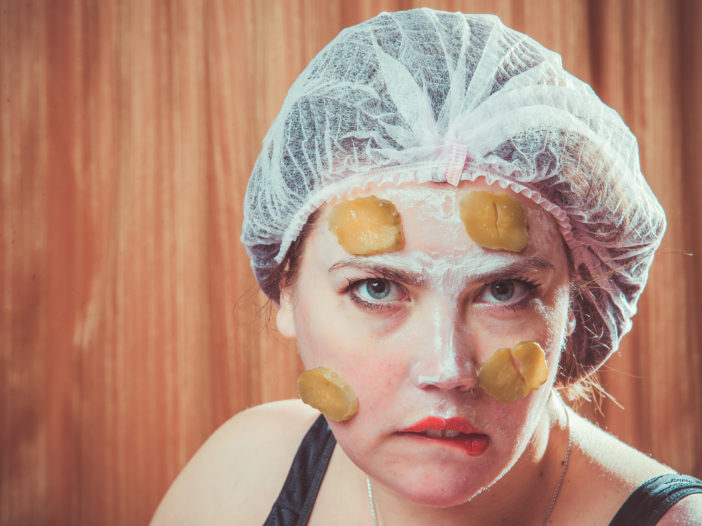
It is very common for peri and menopausal women to experience problems with their skin.
In fact, many women start to get the same sort of acne they had as a teenager. Yep – that’s right. Teenage acne all over again!
And then of course there are the wrinkles that just sort of appear overnight and hot flushes which make the skin go red. Some women start to get rosacea, for the first time. And to make matters worse, you can even start to get random scraggly hairs appearing on your face and chin!
Skin conditions like these may seem frivolous to many, but they do have a massive impact on how you look and feel. And they can really knock your confidence. So, it’s certainly not a topic to brush under the carpet.
These skin conditions are most certainly linked to all the hormonal changes which are going on during your peri and menopause. Oestrogen, amongst other things, stimulates the production of collagen and oils which help to keep your skin supple. In addition, functions like digestion and liver detoxification can become a little sluggish at this time in your life. And so, a combination of hormone fluctuations and your liver and bowels not working as they should, can really impact your skin.
What happens to your skin during your peri and menopause?
Skin and Perimenopause
With fluctuating levels of oestrogen during the perimenopausal years, break outs can become common along with a mixture or dry and oily patches of skin. You may also start to become more sensitive to temperature resulting in your face becoming red and flushed.
Skin and Menopause
And during the menopausal years when oestrogen levels fall away significantly your skin naturally becomes dry, saggy, wrinkly and thinner. Skin can also become itchy, tingly and “crawly”. This is because oestrogen has a role in the production of collagen which is required to keep skin plump and elastic.
During this time, skin can also become more sensitive to the sun. This is because oestrogen helps to regulate melanin, a pigment which gives our skin colour and protection. It is not uncommon to start to see brown age spots on areas such as your face and hands which have had lots of exposure to the sun.
Here are my top tips to care for your skin during your peri and menopause.
Focus on healthy fats
Essential fatty acids found in foods like sardines, salmon, walnuts and flax seeds help to produce your skin’s oil barrier. And this will help to keep your skin hydrated and reduce itchy skin and acne.
Drink plenty of water
Aim for at least 8 glasses per day to hydrate your body from the inside. If you struggle to do this, try and make it easier by jazzing it up a little. Add cucumber, berries or mint leaves. And remember that herbal teas count towards your quota. Coffee doesn’t count though as it is a diuretic which is dehydrating.
Eat the rainbow
Load up on lots of colourful fruit and veg, high in vitamin C. This is a powerful antioxidant to protect the cells of your skin from damage.
Choose foods high in Vitamin E
Foods such as almonds, avocados, spinach and sweet potatoes are all high in vitamin E which is essential for the maintenance of healthy skin. It helps prevent UV damage and has an anti-inflammatory role in the skin.
Reduce alcohol
Alcohol will prematurely dry out your skin and make wrinkles more pronounced. It can cause the skin to be puffy and increase the risk of rosacea. It can also make the skin inflamed which leads to a blotchy and red skin.
Don’t forget to exercise
Exercise helps to increase the production of collagen which is key to younger looking skin.
Supplement with vitamin D
If you are prone to skin conditions like psoriasis and excema, vitamin D can help as it reduces cell proliferation
Try some collagen powders
Your skin is made up of 75% collagen, but your production falls dramatically during your mid life years. And therefore, collagen powders can be very effective in increasing amounts in your body.
These can be added to smoothies, soups and blended in with your favourite drinks.
Look after your liver and gut
Try and include cruciferous vegetables (broccoli, cabbage, and kale) along with sulphur containing foods (eggs, garlic and onions) daily to help your liver detox. And include lots of fibre to support bowel movements.
And don’t forget the sun cream all year round
If you would like to understand more about looking after your hormones during your peri and menopause, then do get in touch. I would love to help.
